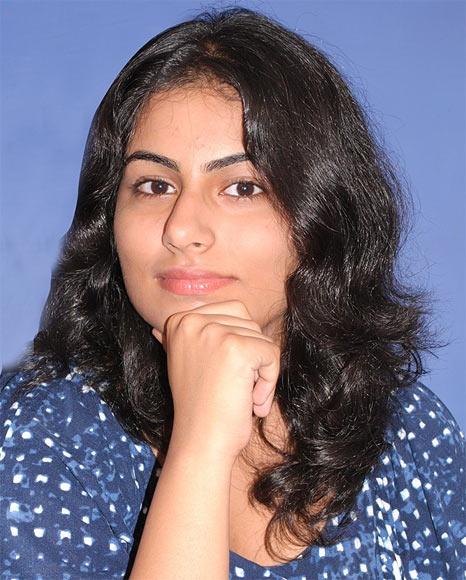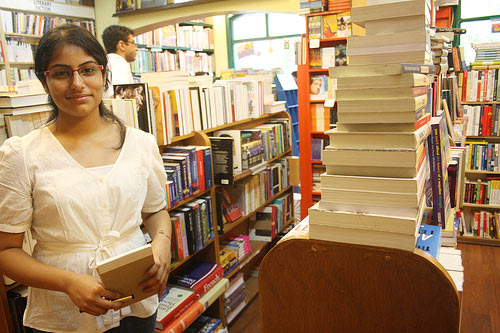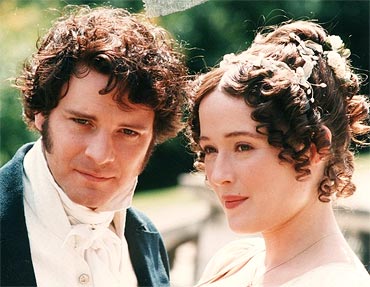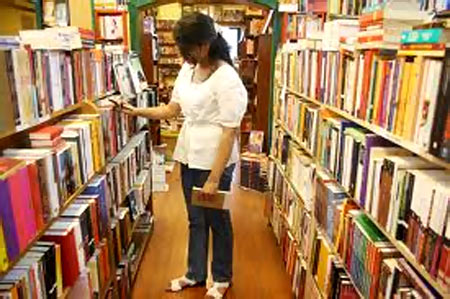
Delhi University student Prashansa Taneja tells us how she fought through her failure in an English aptitude test and what it means to win the prestigious North American award for her essay...
When Prashansa Taneja appeared for the Common Aptitude Test for English (CATE) in 2012, she did not expect to fail in it.
An academically bright student through school -- she had a CGPA of 9.4 and had scored 94 percent in her Class 12 board examination -- Taneja did not even score 50 per cent in the CATE.
"I scored only 19 out of 40 in the comprehension and theory section," she recalls of the exam that was scrapped this year when the Delhi University revised the three-year undergraduate programme and extended it by a year.
With a poor CATE score, Taneja wasn't able to get admission for a course of her choice at most of the Delhi University.
She hid her disappointment from her parents because she "did not want them to worry" but in the process, lost her confidence, she says.
"Till then I thought I was good at the language, but after the results were out, I'd become very self conscious and thought I was really not good at my English,” shares Taneja who eventually managed to get admission to Jesus and Mary College in Delhi where her class 12 scores were considered over CATE.
At JMC, she chose literature as her subject and spent most of the time reading the works of several Hindi, South Asian and French writers – Upendranath Ashk, Krishna Sobti, Murielle Spark and Sylvia Townsend Warner are some of her favourite authors.
Slowly, she grew confident of her abilities and today, after winning the first prize for her essay -- Lovers of Their Time: Untimeliness in Pride and Prejudice, from the Jane Austen Society of North America (JANSA)—she's proven that nothing's impossible for those who believe in their dreams.
By winning the award which comprises a cash prize of $1000, Taneja becomes the first and the only South Asian student to have won it at the undergraduate level. Taneja has been trending on Twitter after she put out an appeal to help her raise remainder of the funds to travel to the US -- she needed $1000 more to cover her expenses for the trip.
The young achiever who is pursuing her graduation in literature lives with her parents in Delhi -- her father Ashok Kumar Taneja operates a construction business and mother Nirmal Taneja tutors students at the high school and college level.
In the following pages, the 20-year-old talks about her favourite author Jane Austen, her decision to choose literature and why it is important to stick by your choices. Read on...
If you wish to contribute, follow this link and donate to Prashansa Taneja's Jane Austen Conference Travel Fund
Please click NEXT to continue reading Prashansa's story...

Can you tell us what is JASNA and how did you connect with them?
The Jane Austen Society for North America is a culture club that appreciates Austen and her literary work.
I found this website while I was into my first semester of college.
Jane Austen is one of my favourite authors and when I came to know that JANSA has an annual essay competition, I wanted to give it a try.
The competition was announced in November last year and the theme had to be centered around the author.
I had read all six novels by Austen and had quite a grip on her style of writing and the way she presented her characters, but when I sat down to write, I realised that I wasn't able to pull my thoughts together.
I spoke to professor Shobhana Bhattacharji and asked her if she could help me. Professor Bhattacharji helped me edit the essay and put it in perspective.
Tell us a little about the essay that won you the prize. Why did you choose the particular topic and book?
I was 12 when I first read Pride and Prejudice. Before I entered college, it was the only book I had read twice. Each time I read the book I related better to Austen and the characters in the book.
Anyone who has read the book even once would agree that there is something about the book that lingers long after you've read it.
Even though the book is set in the 19th century the characters and the situations they are in are relevant even today.
In every family, there is a woman like Elizabeth; the socio-cultural issues are also the same across continents -- parents worrying about their daughter's marriage; the social hierarchy that distinguishes the rich and the poor and how we adhere to some of the unwritten norms of the so-called society.
When did you realise that you are the first South Asian student to ever win this prize?
I had sent the essay on May 15, 2013 two days before my semester exam on May 17. I wasn't really sure if I'd even make it through.
In fact I had not even informed my parents that I was applying for the competition. I was worried that if I failed and did not score well in the semester exam, they'd feel this was because of the competition.
I'd even started working on the essay which I would send the next year.
When I received the e-mail from JASNA on July 24, I could not believe that I'd stood first. The official announcement was made on the site the following day, July 25.
My parents were overjoyed.
Before entering the competition I had checked the list of past winners, there was just one Indian who had won the second prize in the post graduate category– and this was way back in the year 2000.
At that time, the second prize winner's essay would not be published on the site.
That makes me the first South Asian student to win the prize in the undergraduate category.
All this while I would read essays from other students and writers and be inspired; the award and recognition mean a lot to me.

Which adaptation of Pride and Prejudice have you enjoyed the most? And why?
I enjoyed the BBC adaptation of the book which was released in 1995.
Jeniffer Ehle perfectly fit the role of Elizabeth and she did it with a lot of conviction. I haven't seen the 2005 version, because I simply cannot imagine Keira Knightley playing Elizabeth.
You plan to do a PhD on Jane Austen. What draws you to her?
Right now, I am doing my graduation in literature. But yes, if and when I intend to pursue my PhD, it will be on Austen.
A lot of people say she is a fluffy writer because she writes on women, but I believe she is one of the strongest writers in English literature.
Austen offers psychological insights into each of her characters -- like what is going inside the head of Elizabeth and what leads her to taking those decisions.
She lets you travel into their lives and times, which tells a lot about how much importance the author has lent to human emotions.
Very few writers have been able to do that.
You’ve interned at the Sunday Guardian -- when was this? Please tell us more about your experience of working with the team and what you learned there.
After completing Class 12, I wrote to editor Prayaag Akbar if I could do an internship at Sunday Guardian.
When I was asked to assist the books editor, I jumped with joy.
I worked there for over a month where I reviewed the latest books, I also got to attend a few literary events in the city.
It was great knowing how the publishing media works -- meeting deadlines, interacting with new people was a different experience.
Even today, whenever I find the time, I review books for them.

Will you be attending the AGM in Minneapolis -- how do you plan to contribute to the meeting?
Now that I have won this award, I don't want to miss the opportunity.
There will be so many people -- academicians, critics, writers and they'll be coming there from all over the world.
Some of those names have been attributed to in my essay and it would be a privilege to meet them in person.
Since it's more like an exchange programme, I need to read a little more so that I can be prepared for the event. But before that, I need to arrange the funds.
You have started an online campaign requesting people to help you with funds to attend the meeting. How much money do you need to attend the conference and how has the campaign helped you so far?
The JASNA prize money of $1000 is a huge amount, but travelling to the US is expensive. The air ticket works to about 1400$ and once you land there, there is transportation to take care of.
When I knew I had won the award, I had written to my college authorities to find out if they can help me fund the trip.
But I am yet to hear from them.
Meanwhile, I had read about a Canadian journalist Naheed Mustafa who had raised funds through an online campaign and I thought I must also try it.
That's how I came to know of indigogo.com. Through the site, I could appeal to people to help me with the money – anyone who has a credit card can log in to the site and transfer money.
It is absolutely safe as the amount gets transferred to my personal account.
It's been less than 24 hours since the post went live and the response has been overwhelming -- I have already managed to collect 500$.
The annual meeting is scheduled to take place between September 26 and 29 of this year, and I am expecting more people to help me.
If you are not able to manage the funds, what are your alternate plans?
Frankly, I haven't thought of it yet. I really hope to make it there. Even if I don't, I would still be happy that my essay won the prize -- it's a huge thing for me.
Besides reading and writing, what are your other interests?
I enjoy watching old Hindi films and American films of the 60s. Besides that, I am also translating Upendranath Aksh's memoir Manto Mera Dushman from Hindi to English.
Do you think literature is a good stream to pursue a career in? Why?
I think it is a good option for those who are passionate about reading and have a keen interest in books and language.
But there are not enough public libraries for students who want to read. So that might be a limitation.
What according to you are the career opportunities for students such as yourself?
For those who chose to follow their heart, the career opportunities are plenty -- with an additional degree in law, you can pursue a legal career.
Journalism -- television, publishing and editing; and teaching are some of the most opted careers.
What is your advice and message to young readers?
I am too young and to be frank, I am the one who needs advice at this stage. But yes, I would like to tell my friends and young readers that you must do what YOU feel; follow your heart.
Sometimes things might not work the way you want, but you have to learn to trust in you and tell yourself that no matter what (happens) you will manage.
And it comes from knowing what you really want (from your life and career) and sticking to it.
If you wish to contribute, follow this link and donate to Prashansa Taneja's Jane Austen Conference Travel Fund.